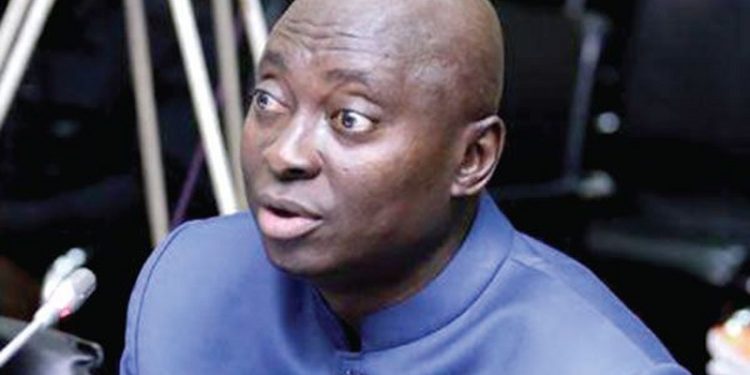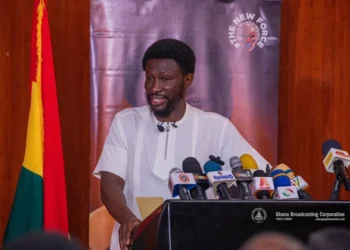Take-or-pay power purchase agreements signed by the Mahama administration have cost the state $968 million so far, in terms of payments for idle capacity and reserve margins, the Chairman of the Mines and Energy Committee of parliament, Mr Samuel Atta Akyea, has said.
At a press conference in parliament on Wednesday, 14 June 2023, Mr Atta Akyea referred to the Ghana Integrated Power Sector Master Plan (IPSMP) and the Energy Commission’s work, which, according to him, showed significant overcapacity in the country’s energy sector.
“Under Generation and Demand of the 2019 IPSMP, the modelling results confirm that there is significant overcapacity in Ghana, that this overcapacity was expected to continue for 5 to 7 years when the power plants under construction are commissioned”, he said.
The report further noted, he added, that “the reserve margin in 2018 and 2019 were significantly higher than the planned reserve margin of 20%”.
Furthermore, he said “the overcapacity challenge is expected to continue into the mid-2020s”.
The Abuakwa North MP noted that “between 2017 and 2020, the annual cost of idle capacity ranged between US$ 105.4 million and US$ 373.7million per year”.
Over the period, he said “a total amount of US$ 368 million had been paid for idle capacities and a further US$ 600 million had been paid for the cost of reserve margins totalling US$968million”.
Mr Akyea, however, mentioned that some of the terms of the PPAs have been renegotiated.
For instance, he said: “We note that the AKSA Emergency Power Agreement (EPA), after expiration on 31 July 2022, was renegotiated by ECG with better terms for 15 years, with a dispatch guarantee of 40%. This is far better than the full take-or-pay arrangement under the expired EPA”.
With the 205MW AKSA PPA, Mr Akyea said the introduction of a dispatch guarantee has helped to beat down the cost incurred by the state, as far as the payment for excess capacity is concerned.
He explained that it is meant to provide “system reliability in the middle and the northern belts of the country based on a system reliability study by the Ghana Grid Company (GRIDCo)”.
“To achieve the objective of reliability, there is the need to have a level of guaranteed dispatch of the plant”, he noted.
He said the dispatch guarantee provided for in the new terms for contracting PPAs “is also a gradual means of reducing the cost of excess capacity payment that has plagued the sector from the numerous take or pay agreements”.
“The non-dispatch of this plant will save the country 60% of the cost compared to the original contract”, Mr Atta Akyea added.
Ghana’s unsustainable debt largely attributed to energy sector – World Bank Rep
A few weeks ago, Mr Pierre Frank Laporte, the World Bank (WB) Country Director to Ghana, said Ghana’s energy sector debt is a major contributor to the country’s debt woes.
In an interview monitored by GNA, the country director indicated that his outfit had identified certain factors that were driving the country’s debt situations.
According to Mr Laporte, one of the factors the bank identified is the energy sector.
He said the deficiencies in the sector, characterised by the tariff systems and management issues coupled with expensive power purchases by the state, in addition to transmission losses, were the major problems in the energy sector driving Ghana’s debts.
He said the mismatch between the production cost of the Independent Power Producers (IPPs) vis-à-vis how much consumers paid led to an upsurge of debts since the Government could not make financial commitments to them (IPPs).
Mr Laporte also said the Power Purchasing Agreements (PPAs) the government had signed were expensive. In addition to the exorbitant power purchases, the country was paying for energy it does not use due to the “take-or-pay contracts.”
“In the case of Ghana, those contracts that have been signed as PPAs are just expensive and the kind of PPAs signed are take-or-pay. You pay although you do not use it. The fact is that in the past few years, Ghana entered into an agreement at the wrong rate and the wrong price, and it has impacted the debt situation.”
He asked the Government to pursue some reforms in the areas of tariff adjustments, addressing the transmission losses through improved infrastructure and restructuring the power purchasing agreements consistent with the energy demands of the country to reduce a significant portion of the debts.
The WB Country Director acknowledged the progress made thus far via the recent increment and subsequent approval in tariff by the Public Utility Regulatory Commission (PURC), saying much could be achieved if the intended reforms in the energy sector were implemented.
He subsequently advised the Government to take advantage of the West African Power Poll, to provide cheap electricity for its people and industry.
According to the Fitch Ranks, the energy sector is the biggest driver of the national debt as the West African country currently owes independent power producers to the tune of $ 1.58 billion.
Fitch Ranks also said the country had initially reached out to the IPPs to restructure their debts in view of the external and domestic debt restructuring but the companies objected to the proposal.










Discussion about this post